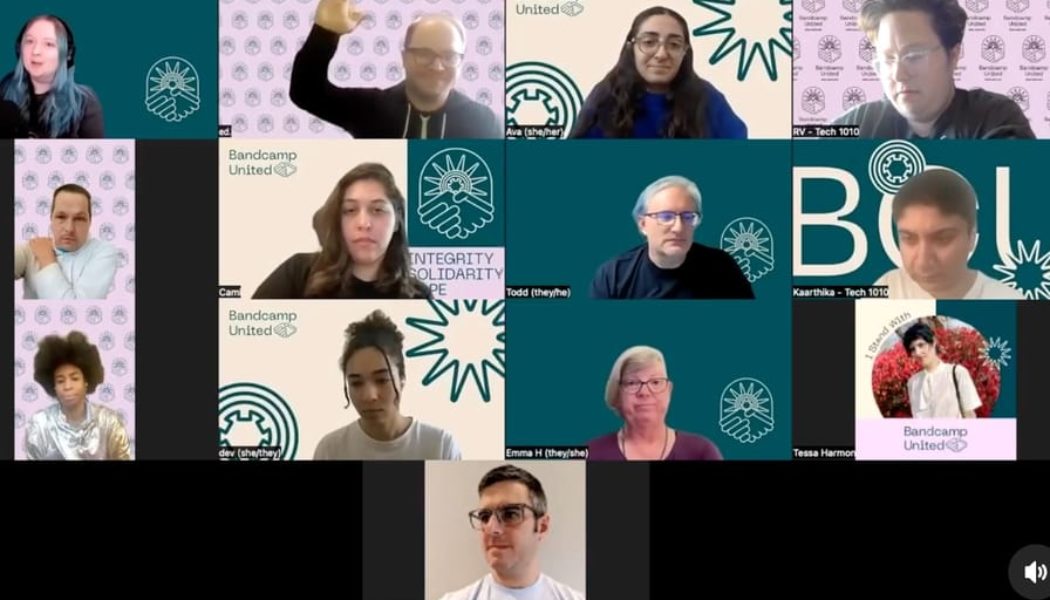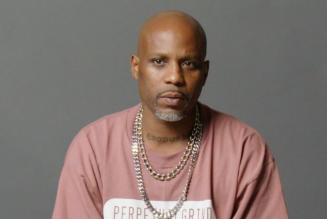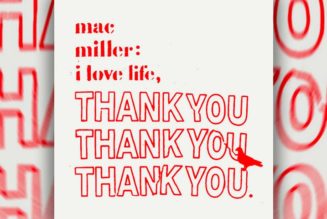In 2017, America’s most exciting punk band was scraping by. Downtown Boys, a Providence, R.I.-based act, had a cult following, a Coachella performance under their belt, and glowing reviews in every major music outlet.
Despite their accolades, “a band like us…could barely get by, busting our ass, touring half the year, and live off that,” says Joey La Neve DeFrancesco, the band’s drummer.
A few short years later, Covid-19 struck, and what had been a precarious but doable situation became impossible. Passive income for all but the biggest superstar acts had already disappeared thanks to the economic upheaval that accompanied streaming. Then, as lockdown restrictions set in, touring—which, in the Spotify era, is where bands actually make most of their money—shut down, shattering the glass that kept the scrappy existence musicians know they’re signing up for separated from sheer destitution. The pain didn’t stop when live music returned; instead, artists found that the industry was even less profitable for them than before. DeFrancesco believes there’s no going back. “Even that would be impossible,” he says, “that very meager existence.”
This turmoil has created acute hardship for musicians. But it has also generated something else: the will to fight back against the hyper-consolidated, increasingly tech-run industry that appears determined to rob musicians of a sustainable career. Since 2020, a small but powerful labor movement has emerged within the industry, uniting musicians, industry workers, and organizers in an attempt to get back a slice of the pie. “People realized: ‘Oh, this is not getting better. This is only getting worse,’” says DeFrancesco.
This movement is still in its nascent stages, but it has notched a significant number of victories. The record label Secretly unionized in October. After a strike, YouTube Music became the first officially recognized union of workers at Google in April. United Musicians and Allied Workers (UMAW), a group of music workers founded in 2020, collaborated with Rashida Tlaib on legislation that would force streamers to pay royalties comparable to physical record sales—and is gearing up to take on the South by Southwest conference, the industry’s biggest yearly event.
The latest win came on Friday, when around 40 designers, engineers, data analysts, support staff, and journalists at the music marketplace and publication Bandcamp voted to form a union, with over 80 percent support. The stakes of this election are higher than they seem.
Since 2007, Bandcamp has been a beloved platform for indie artists and music fans to discover, buy, and sell music unavailable through traditional channels. Bandcamp is not a streaming site—there is no volume button or ability to make personal playlists—but the online record store and merch shop has become central to the economy of independent music. Many indie artists use Bandcamp as their main website. Then there’s pay: Artists make under a penny per stream on Spotify, but when a fan buys an album or T-shirt on Bandcamp, the artist gets 82 percent of the profits. Fans have to stream a song 5,000 times for the artist to net the same $20 they see from a T-shirt purchase on Bandcamp.
In the grand scheme of things, Bandcamp might be a Band-Aid on a gushing flesh wound. But it became a more crucial one in March of 2020 when the pandemic cut off income for musicians. The site began waiving its 10–15 percent cut one Friday a month, in a campaign that became known as “Bandcamp Fridays.” On these days (which are ongoing, though no longer every month), artists take home nearly 100 percent (minus processing fees) of every sale. This past February, Bandcamp said that it had paid over $95 million to artists over the course of 27 such Fridays. Hether Fortune, the founder of the post-punk band Wax Idols, told Pitchfork that she made $1,500 on one Bandcamp Friday in June 2020—more than she estimates she’d made in five years on Spotify. Producer Matt Hopkins, who makes music as 2 Mello, told the tech website GamesIndustry.biz that Bandcamp is his main source of income.
Unlike Spotify, Bandcamp is profitable, suggesting that paying artists fairly can be a part of a good business model. In the past few years, it has grown from around 40 employees to roughly 120.
Two years into the pandemic, however, something threatened to rip off the Band-Aid. In March of 2022, Bandcamp’s owners announced that they’d sold the site to Epic Games, the $32 billion maker of the video game Fortnite, roughly 40 percent of which is owned by Chinese tech conglomerate Tencent. The announcement baffled tech experts and Bandcamp workers alike. What did Epic, the company behind the most popular video game in the world, want with an indie music platform? Would they strip it for parts? Did they need electronic music for games? Would they put a Bandcamp storefront inside Fortnite, hawking math rock and freak folk to teenagers?
“It was a surprising move,” says Ed Blair, a Bandcamp support specialist. “We are pretty dissimilar from Epic in a lot of ways.” It wasn’t just that Epic was unpalatable to Bandcamp’s workers DIY ethos—as in any corporate acquisition, the threat of layoffs or the dissolution of the smaller business altogether inevitably loomed.
“It was shocking,” says DeFrancesco. “We’ve seen this before. Big companies gut the smaller company or radically change things to make it profitable and essentially degrade it to where it’s unusable.… a lot of people were concerned.” As one user wrote on Reddit’s r/BandCamp: “Epic is going to ruin Bandcamp, it’s just a matter of when.”
Epic’s objectives are not entirely opaque. Company CEO Tim Sweeney has a “grand vision” for “the metaverse.” Fortnite is arguably the most established example of the otherwise still hazy concept of a metaverse, insofar as people interact inside it via avatars, doing lifelike activities such as attending a contemporary art exhibition or a rap concert. In the past two years, Epic has bought up companies involved in augmented reality, virtual reality, motion capture, facial animation, and 3-D modeling. In a Twitch livestream last December, Sweeney said that his plan is to “[bring] these pieces together into something that comes closer and closer to the metaverse from science fiction.” Bandcamp is likely part of that plan.
It’s possible Epic could tap Bandcamp to curate virtual concerts or game soundtracks. But the common theory among insiders and experts is that Epic sees Bandcamp as a vehicle for licensing music for virtual experiences.
Epic has thus far kept its promise that Bandcamp will remain functionally independent. So far, no major changes have been made to its workplace or operations. In fact, staff say that Epic introduced superior benefits and a bonus structure. This is consistent with another theory, put forth by tech journalist Tom Merritt on the podcast Daily Tech News Show, which is that Epic bought Bandcamp, in part, as a statement about fair creator marketplaces. Despite its market share, Epic styles itself as an artist-first, anti-establishment Big Tech challenger and a champion of indie gamers. Sweeney (without much success) sued Apple in 2020, claiming that the requirement that all iPhone apps be bought via the App Store and its 30 percent cut of in-app sales were monopolistic. This came after Fortnite was booted from the App Store for attempting to use its own payment system and sidestep Apple’s cut. It wouldn’t be the first time Epic acquired a company to make a point. In 2021, Epic bought ArtStation, a marketplace for visual art, and instantly lowered the company’s cut from 30 percent to 12 percent as, TechCrunch wrote, “an example to the wider community as to what a ‘reasonable’ commission should look like.”
Conversations about unionizing at Bandcamp predated Epic, but they ramped up after the deal. According to workers, unionizing was less about Epic’s potential plans than the precarious state of music the acquisition represents. With the click of a “send” button, Epic could wipe out one of the last viable ways for artists to sell music directly to consumers. Even if Epic appreciates Bandcamp’s ethos, being a pawn in a war between two tech giants is little comfort. The union drive was “more proactive than reactive,” says Eli Rider, a 28-year-old data analyst.
“I don’t know what the future holds for Bandcamp,” says Blair. “I feel a lot more comfortable working at a Bandcamp where the workers are able to collectively bargain…and act if something ends up feeling against the spirit of the company.”
Workers had concerns about pay equity, transparency, racial justice, and trans rights in the workplace. Early organizing conversations were about “the tenor of the world,” says Ed Blair, a Bandcamp support specialist, citing everything from anti-trans legislation to Brexit’s impact on record shipping to the price of touring visas to Ticketmaster’s buying up venues and taking a larger cut of ticket sales.
Bottom line: Things in music are bad, and Bandcamp’s staff believes a union can help make them better—or, at least, stop them from getting even worse.
When Bandcamp and Epic hired Foley & Lardner LLP, a firm specializing in “union avoidance,” and attempted to exclude eight employees from the union—a move Bandcamp United says was a deliberate attempt to delay the election—UMAW were the ones to deliver a petition with over 3,000 signatures from artists and fans to Bandcamp’s CEO. Support didn’t waver when Bandcamp management contacted at least two record labels who were supporting the union. Kevin Duquette, label manager at Top Shelf Records, a company that uses Bandcamp, says that management regaled him on a call with anti-union talking points, pointing to recent company-wide raises and claiming that the union drive lacked majority support. “I was upset by and shocked by how tone-deaf the messaging was,” says Duquette. He got off the call feeling that a “union was now much more essential.”
Bandcamp cofounder Ethan Diamond said via an Epic spokesperson that it’s “common for companies to employ law firms to represent them in NLRB proceedings” and that “both Bandcamp and the Union have employed outside counsel.” Diamond also confirmed that management “requested to exclude a few employees from the bargaining unit that meet the NLRA’s definition of supervisors.”
These talking points play on a skepticism that highly paid tech workers need unions. But this attitude is changing. Music’s labor music has risen in parallel to that of the tech industry. Bandcamp workers were inspired by Kickstarter, which became the first tech union in America with a contract last year. Like Kickstarter, Bandcamp workers affiliated with the Office and Professional Employees International Union. Their local, Tech Workers 1010, is currently negotiating contracts for companies like Code for America, Big Cartel, Nava, and Findhelp.
Kaarthika Thakker, an organizer with 1010 who worked with Bandcamp United, has seen the power of labor power in tech firsthand: She worked at Google when employees protested the company’s decision to help develop AI for the US military, as well as YouTube’s refusal to demonetize hate speech. She says tech workers are developing a playbook that’s working—and more often than not, working together. Blair says Bandcamp United has been in close contact with 1010’s other shops, as well as YouTube Music, and garnered support from unions across industries, from Starbucks to the Audubon Society.
“Tech is where the money is…and it’s where the economy is going broadly,” says Thakker. In her view, small shops like Bandcamp, which can organize quickly to gain seats at powerful tables like Epic’s, are strategic. “Look at how much money UPS makes, and how many folks need to be in that union…. it’s an economy of scale.”
Soon, Bandcamp workers will begin bargaining for a contract. (The company released a joint statement with the union on Friday that it is “committed to working together to continue to advance fair economic conditions for our workers and the artists who rely on us” and “negotiating with an open mind.”) When they get one, they’ll be in a position to help steer Epic as it ventures forth into the metaverse, taking musicians’ security with it. People in other parts of the music business will take note, and maybe some of them will organize too. And then all of these workers might forge bonds with their counterparts in other industries—people at Amazon, or Starbucks, or Trader Joe’s, or YouTube. A union at Bandcamp can’t save music, but workers across industries might be able to save each other.
“There’s going to be a point where all these people are going to be in a room together,” Blair says. “What are we going to be able to do in the future?”








